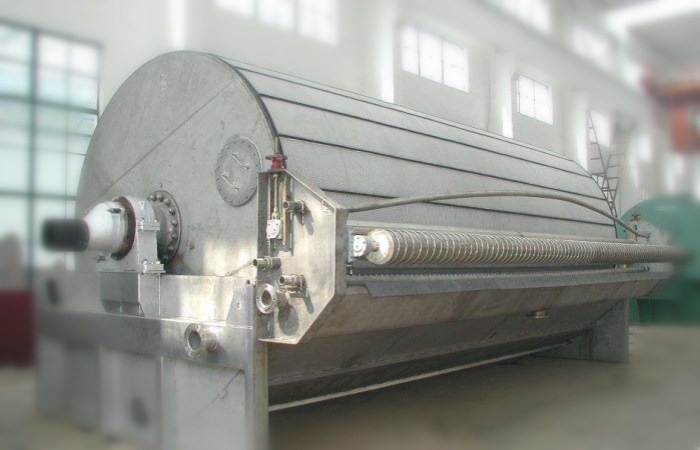The vacuum rotary drum filter, as an efficient and continuous solid-liquid separation device, is widely used in various industries such as chemical, mining, pharmaceutical, food, and environmental protection. However, during its operation, it may encounter a series of common issues that not only affect the device's operational efficiency but also potentially harm product quality.
Insufficient Vacuum Degree
Insufficient vacuum degree is one of the most common failures in vacuum rotary drum filters. When the vacuum system cannot work normally or there is a leakage, it will lead to a decrease in the vacuum degree, thus affecting filtration efficiency. The specific reasons and solutions are as follows:
Vacuum pump failure: Check the working status of the vacuum pump to ensure it is operating properly.
Leaks in pipes and interfaces: Inspect the vacuum system’s pipelines and interfaces to ensure they are securely fastened and no leakage.
Excessive Rotational Speed Leading to Short Filtration Time
When the rotational speed of the equipment is too high, the filtration time is shortened, resulting in less moisture removal and affecting filtration efficiency. To address this issue, the following measures can be taken:
Adjust the rotational speed: Modify the drum's rotational speed according to the material characteristics and process requirements.
Optimize process parameters: By adjusting slurry concentration, washing liquid flow rate, and other process parameters, filtration efficiency can be improved.
Excessive Immersion Depth
Excessive immersion depth of the drum increases the contact area and time between the drum and the filtrate, which causes the filter cake to thicken and moisture to be harder to remove. Solutions include:
Reduce feed rate: Lower the feed rate to reduce the immersion depth of the drum, thereby reducing the thickness of the filter cake and improving moisture removal.
Optimize equipment structure: Adjust the drum’s diameter, length, and other structural parameters based on the material’s filtration properties to enhance filtration performance.
Poor Material Filtration Performance
The filtration performance of the material directly affects the vacuum rotary drum filter's filtration efficiency. When the material has poor filtration performance, the following aspects should be checked and addressed:
Material pretreatment: Strengthen material pretreatment, such as grinding and sieving, to remove large particle impurities from the material.
Adjust process conditions: Modify slurry concentration, type of washing liquid, flow rate, and other process conditions to improve filtration performance.

Bolian Vacuum Rotary Drum Filter Cloth has several advantages, including easy cleaning and resistance to clogging, reduced filter cake moisture content, improved filtration efficiency, long service life, and energy savings.